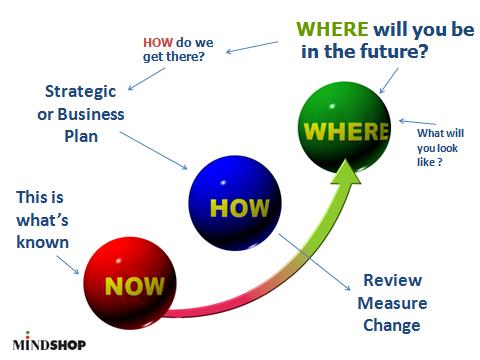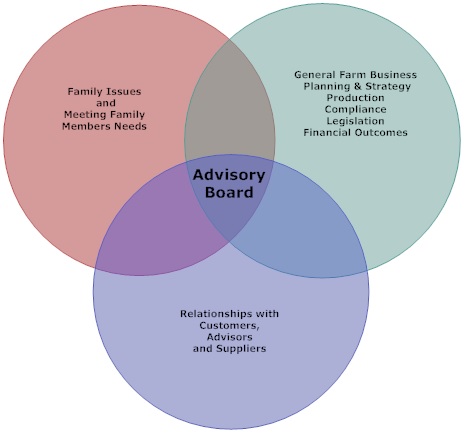Managing a million dollar farming business
Author: Bill Winter (Adviser) | Date: 12 Mar 2015
Take home messages:
- There is a need for corporate-style disciplines and processes to run successful farming business that have million dollar incomes.
- The most important attribute in any successful family business is that they have a clear and easily understood vision of what the business will look like in the future. Importantly, everyone in the business understands and buys into this vision.
- An advisory board with two or three external people provides a clear advantage because they bring independent thought to the table and can ask the questions that families sometimes avoid.
- Be open-minded, look outside your own backyard for ideas and be a sponge for new information.
Australian Government statistics indicate that there are approximately two million small to medium enterprises in Australia that employ up to twenty people and turnover up to two million dollars a year. The majority of family farming entities would fit these criteria.
So, what challenges face these farming families in 2015 as they confront a constantly changing business landscape, farm consolidations, technology driven productivity, family succession issues, markets driven by world forces, government interference, and a need to grow and remain profitable?
A million dollar plus income farm is a big leap-up from one generating three or four hundred thousand dollars a year and, with that size, you start to become what I call a large small business as a family farming enterprise. Given the importance placed on compliance in business today, there is a clear need to apply corporate-style disciplines to running farming businesses and be clear in how they develop strategies to ensure future profitable survival.
Succession, retirement, and how to handle asset distribution with the next generation coming through, are the main concerns for baby boomer parents who are still holding tight control on the farm. There are many stories of some parents who still tend to control the decision making and are somewhat reluctant to take a risk. They are unsure how to finance retirement away from the property and this can lead to conflict between the different generations. The challenge is how you separate the business activity of the farm, from the family issues and emotions that go with families in business.
A key is the acceptance of the need for change and for farming families to implement business disciplines and process that most successful small to medium enterprises in manufacturing and service industries have already done. The challenge is to introduce business systems and procedures to manage growth and at the same time not lose the family values and culture that made you successful from the beginning.

The many facets of business activity, people issues, procedures and systems that are needed to operate a successful farm are often under estimated by those on the land. A farming business is the same as many other small family businesses across Australia. It does not matter what you do, produce or sell, business systems, governance, compliance, and the need to communicate and relate with people do not differ.
A list of issues that require attention as family farms grow, and to meet obligations as responsible family businesses would, include:
- people relationships;
- internal business systems;
- business governance and compliance;
- external business relationships;
- continuous improvement;
- technology;
- environment and sustainability;
- workplace safety;
- financial discipline and reporting;
- managing risk; and
- family relations and succession.
If, as I believe, today's farming families and other families in business are the custodians of the assets for the next generations, then we must ensure that we manage and improve what we have under our control.
The next generation of farmers are married, have young children, and are embracing constant change. They understand that food and fibre are long term sustainable industries operating in a global environment often driven by research and technology. Farmers must be efficient, low cost producers to survive. There is limited opportunity for small-sized holdings unless you are a niche, high value producer such as those operating direct farm to gate.
Successful farmers are looking to build and improve their farm output and if the present farm size is too small, they lease other properties because they see a better use of resources, equipment, people and improved productivity per hectare operating larger holdings.
Successful family business owners have to operate with an attitude that is no different to the way other successful large companies operate in metropolitan based locations. They:
- have a great internal culture and honest values;
- understand the need to develop and engage their employees;
- have strong business disciplines, written policies and procedures;
- are up-to-date with technology;
- have relevant reporting and data produced on a monthly basis;
- care about the environment;
- focus on workplace safety; and
- engage a strong business board with external advisors and are prepared to listen and seek advice as required.
The most important attribute you will find in any successful family business is that they have a clear and easily understood vision of what the business will look like in the future. They can articulate this vision and ensure that everyone who comes in contact with them will embrace it, especially the employees. In a family farming business it is essential that all family members understand the vision for the future, and want to be involved in getting there.

Figure 2. All family members need to understand and engage with the business's vision.
Other important drivers for success are having a strategy on how you are going to achieve the future vision, followed by a business plan that is well thought-out and developed with input from all members of the family. Tasks and responsibilities are allocated to individuals as they need to be held accountable.This process should include regular reviews of your action plan, updates of the plan and the ability to make changes if required.
At all times open and honest communication is an essential enabler to bring about success.
In a family farming enterprise, as in all family business, individual members have different and unique personalities and different personal ambitions. You should not expect everyone to think and act the same, and every individual should have a right to be heard. Compromise and the ability for individuals to adapt to what is right for the business to succeed without being distracted by family emotions is important.
There is a clear advantage in having an advisory board with two or three external people and who can bring independent thought to the table and who can ask the right questions that families sometimes push to the back ground.

Figure 3. Advisory boards can bring independent thought to a family business.
Directors and owners of a family farming business have the same legal obligations as a major corporate entity and the implementation of an advisory board or panel should be a high priority as the responsibilities and obligations under the Corporations Act 2001 can be onerous.A past article in the Australian Institute of Company Directors magazine, Tony Featherstone highlighted that some of the challenges for families implementing a formal or advisory board are:
- the line between family and business is blurred leading to disputes;
- in-laws and extended families can add another layer of complexity;
- companies owned by several family members can find it harder to share a common vision;
- succession problems can be a huge issue; and
- some family leaders resent advice from outsiders.
In today's business environment change is constant and happening at a very fast pace. For many farming families it is the ability to accept that change is required to maintain future financial sustainability and internal family harmony. However, you cannot just talk about change, you have to create a sense of urgency and get ownership by everyone involved if you want to take your business to a higher level of performance.
On the other hand, do not embark on change for change's sake. Once you have clearly defined your vision of the future, and identified your core strategies to achieve that vision, you will recognise the roadblocks. You can then identify what change is required to bring success and financial reward to the farm and the whole family.
To get started on a program of continuous improvement for your business acumen, and to raise the level of professionalism in your business, I strongly advise that you find an experienced external facilitator and conduct some honest and open discussion. Get away from the farm for a day with everyone involved and be prepared to listen and to let everyone have input without fear or favour. Clear actions and accountabilities must follow. A facilitator will be able to implement this and follow through over time.

Figure 4. Create an action plan for continuous improvement.
I always approach a planning session with the following thought in my head, 'The mind is like a parachute, it does not work unless it's open'.
Just as in many capital city located businesses, a desk is a dangerous place from which to view the world. Farmers must get out of their patch on a regular basis and network, attend conferences or updates such as these GRDC Farm Business Updates, read the literature, travel throughout the region and overseas and look, listen and learn from others.
You should be a sponge for information and never assume you know it all.
Contact details
Bill Winter
PO Box 7010, Geelong West, Vic 3218
0411 536 424
billwinter@bigpond.com.au
www.pointnorth.com.au
@BWinter1
Was this page helpful?
YOUR FEEDBACK
